 Petzlover
Petzlover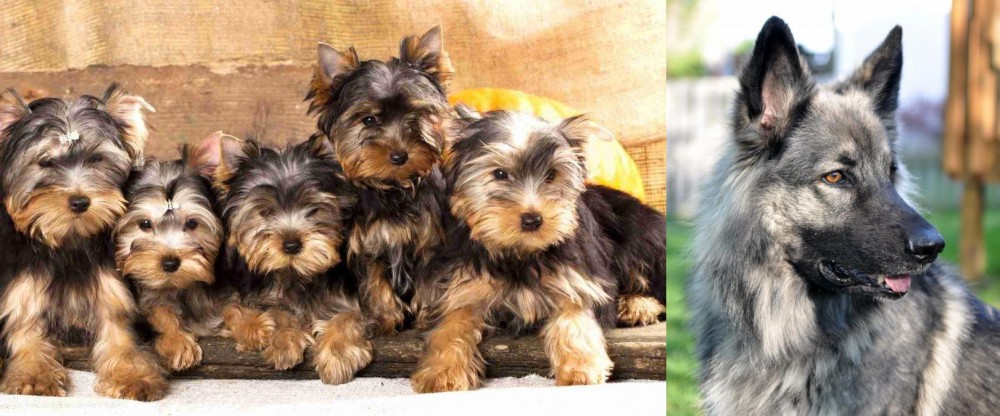 Yorkshire Terrier is originated from United Kingdom but Shiloh Shepherd is originated from United States. Yorkshire Terrier may grow 7 cm / 2 inches shorter than Shiloh Shepherd. Yorkshire Terrier may weigh 62 kg / 136 pounds lesser than Shiloh Shepherd. Both Yorkshire Terrier and Shiloh Shepherd has almost same life span. Yorkshire Terrier may have less litter size than Shiloh Shepherd. Both Yorkshire Terrier and Shiloh Shepherd requires High Maintenance.
Yorkshire Terrier is originated from United Kingdom but Shiloh Shepherd is originated from United States. Yorkshire Terrier may grow 7 cm / 2 inches shorter than Shiloh Shepherd. Yorkshire Terrier may weigh 62 kg / 136 pounds lesser than Shiloh Shepherd. Both Yorkshire Terrier and Shiloh Shepherd has almost same life span. Yorkshire Terrier may have less litter size than Shiloh Shepherd. Both Yorkshire Terrier and Shiloh Shepherd requires High Maintenance.
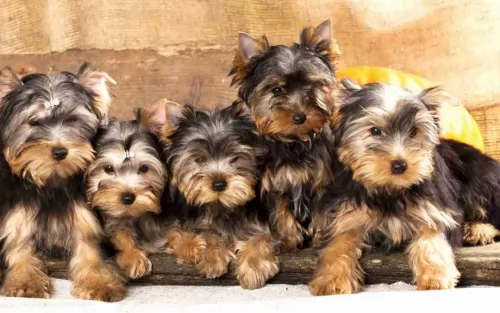 The Yorkshire terrier originated in Yorkshire which is a place in northern England. In mid 19th century workers from Scotland came to Yorkshire in search for work. They brought different varieties of small terriers with them. Earlier they are known as Broken Haired Scotch Terrier and then Toy Terrier. In 1874 they were officially named as Yorkshire Terrier. They begun their journey as hunting dogs and later developed as companion dogs. AKC registered the breed in 1878.
The Yorkshire terrier originated in Yorkshire which is a place in northern England. In mid 19th century workers from Scotland came to Yorkshire in search for work. They brought different varieties of small terriers with them. Earlier they are known as Broken Haired Scotch Terrier and then Toy Terrier. In 1874 they were officially named as Yorkshire Terrier. They begun their journey as hunting dogs and later developed as companion dogs. AKC registered the breed in 1878.
 The Shiloh Shepherd is currently a hybrid that breeders are attempting to develop into a new breed. New York breeder, Tina Barber, out of Shiloh Shepherds kennel developed dogs when in 1974, she attempted to develop a German Shepherd line. She wanted a GSD that was more like the ones she remembered from her childhood.
The Shiloh Shepherd is currently a hybrid that breeders are attempting to develop into a new breed. New York breeder, Tina Barber, out of Shiloh Shepherds kennel developed dogs when in 1974, she attempted to develop a German Shepherd line. She wanted a GSD that was more like the ones she remembered from her childhood.
Tina took her foundation stock out of the AKC and got the FIC (Federation of International Canines) to recognize the Shiloh Shepherd as a separate breed. The FIC is not the same as the FCI or Federation Cynoloquque Internationale. In 1991 the Shiloh Shepherd Dog Club of America was formed, and the shepherd was recognized by the American Rare Breed Association.
Official recordkeeping on the breed began in 1993. The computer system TCCP maintains breed records and the Shiloh Shepherd has at least 9 generations in the system. Tina Barber was president of the Shiloh Shepherd Dog Club of America and oversaw the international club as well. She was responsible for the breed. After her death in 2011, her daughter took her place in working with the breed.
The Shiloh and the German Shepherd were then crossed to develop the King Shepherd.
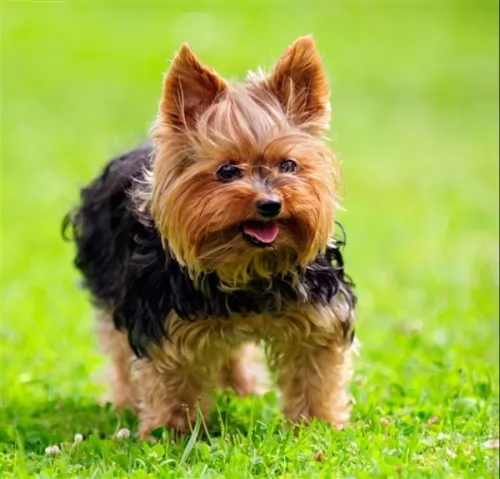 Yorkshire terriers are one of the glamorous member of the dog breeds. They have excellent personality as their owner will be surely proud of them when taking them in public. They like to go outside and make adventures. They are good companion dogs and watch dogs too. They are very affectionate with their owners. Yorkies always bark when any stranger comes and they should be taught about neighbours and when to bark. They will get angry on seeing new dogs and surely chases squirrels.
Yorkshire terriers are one of the glamorous member of the dog breeds. They have excellent personality as their owner will be surely proud of them when taking them in public. They like to go outside and make adventures. They are good companion dogs and watch dogs too. They are very affectionate with their owners. Yorkies always bark when any stranger comes and they should be taught about neighbours and when to bark. They will get angry on seeing new dogs and surely chases squirrels.
They like to spend more time with their people. Leaving them alone for long time is not good. Yorkshire terrier should be treated gently and with love. They love to spend time with older children. They love apartment life if they are made to play and walk daily. Yorkies are the second most popular dog in America.
 Shiloh Shepherds are giant dogs, much larger than the usual German Shepherd Dog. The Shiloh had been bred to be a companion animal and not a guardian or herder. The Shiloh looks more like a wolf than either the German or the King Shepherd Dog. Their back is straighter than the GSD and they are larger, more stable and more intelligent. They were bred to show a complimentary balance between strength and elegance.
Shiloh Shepherds are giant dogs, much larger than the usual German Shepherd Dog. The Shiloh had been bred to be a companion animal and not a guardian or herder. The Shiloh looks more like a wolf than either the German or the King Shepherd Dog. Their back is straighter than the GSD and they are larger, more stable and more intelligent. They were bred to show a complimentary balance between strength and elegance.
They have slightly domed, broad heads with a muzzle that gradually tapers, strong cheekbones and black lips. Their ears are triangles, well cupped and firm. The Shiloh Shepherds eyes are either brown or very dark. They have a straight back which is muscular and broad. Their chests deep and their tails plush, long and curved.
They have a very “heavy” appearance compared with other shepherds. They are well muscled in both the lower and upper thighs. Their coat is plush, and they have a dense undercoat. Their hair is harsh to the touch. There is both a smooth coat and a plush coat with the plush coat being more prevalent.
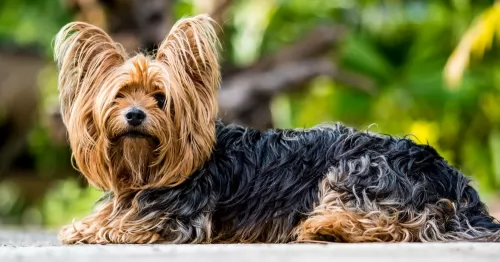 Yorkshire terrier are not so much friendly with children. It is not advised to leave them with children without adult supervision.
Yorkshire terrier are not so much friendly with children. It is not advised to leave them with children without adult supervision.
They were previously used to catch rats and hunt badger and fox. They are excellent watchdogs and defend their territory very well.
They adapts well for apartment living. But they will not be happy if leaved alone for a long time. Yorkies cannot tolerate too hot or cold weather.
They are moderately easy to train. Yorkshire terrier should be trained early when they are amenable to process. Sessions should be conducted with lots of treats and must be short as they will easily get bored.
 The Shiloh Shepherd has some health issues to deal with. These include: They seem to have very sensitive stomachs and intestinal issues.
The Shiloh Shepherd has some health issues to deal with. These include: They seem to have very sensitive stomachs and intestinal issues.
• Bloat – gastric dilatca ation volvulus – twisted stomach or intestines. Needs immediate veterinary care.
• Small intestine bacterial overgrowth – diarrhea, difficulty absorbing nutrients, abdominal pain.
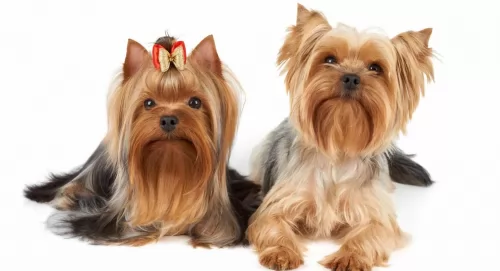 For English bull dog puppies, When you change the puppy food from liquid to solid initially you must give what the dam is having. This is to avoid digestive problems when new food is introduced. The level of liquid food should be reduced in a step by step manner and thus increasing solid food gradually.
For English bull dog puppies, When you change the puppy food from liquid to solid initially you must give what the dam is having. This is to avoid digestive problems when new food is introduced. The level of liquid food should be reduced in a step by step manner and thus increasing solid food gradually.
You have two choices and one is manufactured dog food and another is home cooked food. Commercial brands are not suggested as they contain artificial coloring and chemical preservatives.
Vaccinations should be made at the right time. The food given should be the best.
Yorkshire terrier should be taught tricks by giving rewards. Exercising them has benefits such as maintaining muscles, release pent-up energy, good for heart, good metabolism, good sleep and be active.
 1.Feeding the puppy -Due to the breed’s sensitive stomach and intestinal issues, it is important to feed the puppy a high quality large or extra-large breed of dog food. Feed at least 3 meals per day.
1.Feeding the puppy -Due to the breed’s sensitive stomach and intestinal issues, it is important to feed the puppy a high quality large or extra-large breed of dog food. Feed at least 3 meals per day.
2.Feeding the adult- You will still want to feed a high quality large or extra-large breed dog food two times a day. However, if you feed the pup well and keep the intestinal issues under control, the adult should have an easier time.
4. Games and Exercises Be careful of the puppies’ exercise levels. Their bones grow slower than most so avoid a lot of jumping or strenuous exercise until they are adults. This means that even though they will be very good at agility or flyball and they will love playing them, do not start them when they are puppies. Wait until they are mature. The do well in herding trials, agility and search and rescue. Many make great therapy dogs.